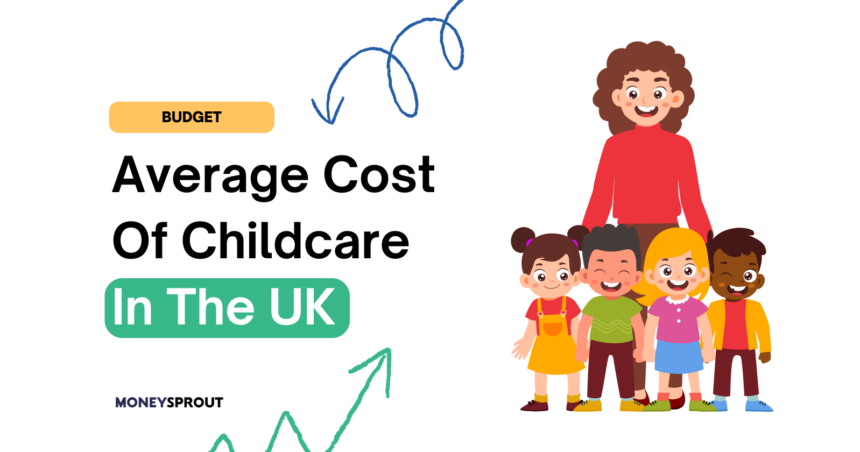Embracing the joy of parenthood is wonderful, but it’s also necessary to be prepared. In the UK, over 2 million families – more than half of those with young children – face financial struggles, resulting in mental health challenges.
With our comprehensive guide to the average cost of childcare in the UK, you will be ready to handle the financial aspects of parenting. Your little one deserves the best care, and you deserve peace of mind.
Quick Overview
Childcare costs in the UK vary based on location and service type. On average, nursery care for a child under two costs £138 per week part-time and £263 per week full-time. Families can access financial support through government programs while negotiating rates and exploring shared care can help reduce expenses.
Key Facts & Figures
- Nursery care for a child in the UK can amount to up to £300 per week.
- London parents face the highest childcare costs in the country, with a 13% increase in hourly rates over four years.
- Families can receive financial assistance through Tax-Free Childcare, including up to £500 every three months (up to £2,000 a year) per child, and up to £1,000 every three months (up to £4,000 a year) for a disabled child.
Average Childcare Cost UK

Childcare expenses can be a significant cost in your household bills once you have children. The cost of childcare varies across the UK, influenced by factors such as location, the type of service needed, and the number of hours required.
Across the UK, sending a child under two to nursery part-time (25 hours) averages around £138 per week, while full-time care (50 hours) costs approximately £263 per week. For after-school care, the average cost is £62 per week.
Thankfully, financial support is available through the government, with eligible families able to receive up to £500 every three months per child, or up to £1,000 every three months for a disabled child.
Here’s a practical tip: Budget-conscious families can consider childminders, who typically charge around 16% less than nurseries.
UK Childcare Cost Factors to Consider
When it comes to understanding UK childcare costs, several key factors come into play, each influencing the overall expense and experience:
- Location: The region where you reside plays a significant role in childcare costs. Urban areas tend to have higher childcare expenses compared to rural areas due to higher living costs and demand.
- Type of Service: Childcare services come in various forms, including nurseries, childminders, and after-school clubs. Each option has its price range, with nurseries often being the most expensive due to overhead costs like facility maintenance and staffing.
- Hours Needed: The number of hours per week you require childcare directly impacts the total cost. Full-time care, typically defined as 50 hours per week, will naturally cost more than part-time care, which may range from 25 to 30 hours per week.
- Age of Child: Childcare costs can vary based on the age of your child. For instance, caring for infants and toddlers may require more specialized attention and resources, potentially resulting in higher fees compared to caring for older children.
- Additional Services: Some childcare providers offer additional services such as meals, transportation, or educational programs. While these extras can enhance your child’s experience, they may also come with additional costs that should be factored into your budget.
- Financial Assistance: It’s essential to explore available financial support options. Eligibility criteria and the amount of assistance available vary, so it’s worth researching and applying for any applicable support programs.
Remember that prioritizing your child’s well-being and development while also managing costs is key to achieving a balanced approach to childcare.
What are the UK Childcare Services Available?
Each childcare service offers unique benefits and costs, catering to different family needs and preferences.
- Day Nurseries: Deliver structured care and education for children during working hours, accommodating both part-time and full-time schedules. Full-time nursery care can cost up to £300 per week.
- Registered Childminders: Provide childcare services in their own homes, providing a more personalized and intimate setting for children. Under twos typically cost around £124 per week for part-time care and £237 for full-time care.
- Nannies: Offer individualized care within the family’s home, providing flexibility and personalized attention. Full-time nannies generally cost £350-£650 per week, while part-time nannies cost £250-400 per week. Costs include National Insurance, tax, room and board.
- Au Pairs: They are typically young adults from abroad who live with a host family, and provide childcare assistance in exchange for room, board, and a weekly “pocket money” allowance. Host families should typically provide at least £90 per week in allowance.
- After-School Clubs: Plan supervised activities and care for children outside of school hours. The average weekly cost of after-school clubs in the UK is approximately £67.
- Holiday Childcare: During the school holidays, childcare can be arranged through various providers, with an average weekly cost of around £138.
- Playgroups/Pre-schools: Provide early education and socialization opportunities for young children. They may charge a fee per session, typically ranging from £5 to £20. Additionally, some areas offer free sessions run by volunteers.
While these estimated costs provide a general overview, it’s essential to inquire about any additional fees, such as supplies or meals, when considering childcare options.
How To Save On Childcare Costs
Dealing with UK childcare costs can be daunting, but there are practical strategies to help alleviate the financial burden.
- Negotiate Rates: Discuss fees with childcare providers, especially if enrolling multiple children or committing to long-term. Many are open to negotiation for reliable clients.
- Flexible Work Arrangements: Explore telecommuting or adjusting schedules to share childcare responsibilities. Coordinate work hours strategically to minimize the need for full-time care and save costs.
- Share Care with Other Families: Reduce expenses by sharing childcare duties with other families. Consider options like nanny shares or cooperative arrangements for mutual support and cost savings.
- Government Assistance Programs: Access subsidies, tax credits, or vouchers to offset childcare costs. Research available government assistance programs to ease financial strain.
- In-Home Care: Consider hiring a nanny or au pair for personalized, cost-effective childcare. In-home care provides flexibility tailored to your family’s needs, potentially saving you money.
- Community Resources: Explore subsidized childcare centres or nonprofit organizations for affordable options. Community resources often offer quality care at reduced rates, supporting families on a budget.
- Early Education Programs: Prioritize quality early education programs for long-term benefits. Investing in reputable programs supports your child’s development and future academic success.
With practical strategies for cutting childcare costs, families can find financial relief while ensuring their children receive quality care.
Wrapping Up
UK childcare costs can be overwhelming; we get it. But armed with knowledge and strategic planning, families can find their way to a balanced budget. Remember, the investment in your child’s care and development is invaluable, but it’s equally important to prioritize your family’s financial well-being.
Read More From Money Sprout:




